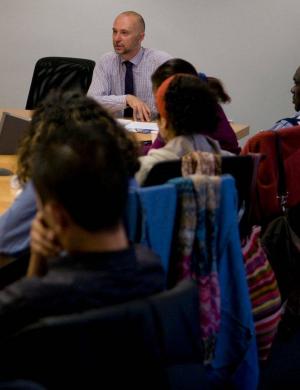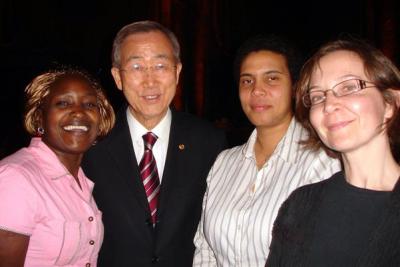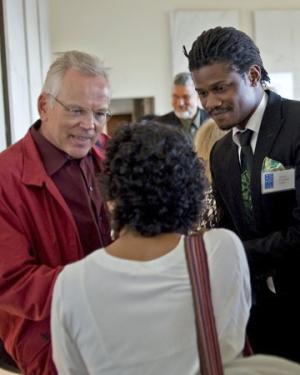
The 2012 Advocates represented eight countries. Photo by Alan Orling.
The HRAP model is structured around four pillars: graduate-level coursework, skills-building workshops, networking, and mentoring. This multi-faceted approach enables advocates to strengthen their understanding of human rights and develop valuable new skills and relationships. The advocates are encouraged to transfer the knowledge, skills and networks gained during the program to their organizations and movements back home.
Coursework
Through academic coursework, Advocates gain a deeper understanding of human rights and other fields that relate directly to their work. Participation in these courses exposes Advocates to alternative perspectives and gives them a more holistic understanding of human rights.
Advocates attend Columbia University seminars, tailoring the academic component of the Program to their interests. Advocates can participate in classes across the University, including at the School of International and Public Affairs, Columbia Law School, Barnard College, the Mailman School of Public Health, and Teachers College.
Skills-Building Workshops
This program provides Advocates the opportunity to learn from expert practitioners through a variety of skills-building workshops and trainings. The skills-building component varies slightly each year according to the Advocates’ interests, but generally includes the following activities.

2010 workshop at Amnesty International. Photo by Alan Orling.
Fundraising & Building Sustainable Organizations
This workshop guides Advocates through the cultivation cycle of major-gift donors to ensure that fundraising efforts are strategic, streamlined, and effective. Advocates identify new funders, write and critique one another’s letters of inquiry and proposals, strengthen their communication skills with prospective donors, and submit proposals to foundations. Workshop sessions also focus on long-term planning, preparing strategic business plans, and other lessons that help Advocates improve the long-term sustainability of their organizations. The course includes both individual and group meetings and is designed to be hands-on and practically oriented in order to yield tangible results.
Human Rights Research, Documentation, & Reporting
Human Rights Watch senior researchers offer a six-week course on human rights research, documentation, and writing. The course includes the following topics: the conceptualization of research projects, interviewing victims and witnesses, interviewing perpetrators and accomplices, and writing. The course is modified each year to meet the specific needs and interests of the Advocates.
Editorial Writing
Advocates focus on writing effective op-eds in support of their human rights advocacy goals. Advocates finish the course with a well-edited op-ed ready for submission to local, national or international outlets.
Effective Presentations
The Advocates learn how to make concise and effective presentations on their work. The Advocates are encouraged to provide constructive feedback to one another in a supportive environment.
Stress Management
Advocates participate in a workshop that provides concrete skills in recognizing signs of stress, primary and secondary trauma, and post-traumatic stress disorder within themselves, colleagues, and the communities they serve. The workshop also provides Advocates with the opportunity to share their own experiences, learn ways to promote healthy work patterns for themselves and their colleagues, and effectively promote high staff morale.
Human Rights Advocacy
This course is designed to develop practical advocacy skills. Advocates become familiar with a variety of tools that they can apply to their respective human rights campaigns. The focus is on developing an advocacy strategy on a current human rights issue, including the identification of goals and objectives and appropriate advocacy targets and methods. Advocates also have the opportunity to explore broad-based human rights campaigns, use of the media, and advocacy with UN bodies, the US government, and the private sector.
Video Advocacy

HRAP workshops are highly interactive
Advocates receive video advocacy training offered by WITNESS, a well-established NGO based in New York that uses video and online technologies to raise awareness with respect to human rights violations. They learn how video can play a vital role in advocacy campaigns without great expense or the involvement of video professionals.
Media Training
Advocates participate in a workshop on press and media work, through which they learn to develop press releases and cultivate media contacts. A key part of the training focuses on improving Advocates’ television interviewing skills through videotaped mock interviews and feedback sessions.
Maximizing Your Time in HRAP
2010 Advocate Bakary Tandia guides the advocates throughout the course of the program on how they can best maximize the HRAP experience.
Theatre of the Oppressed
Jeremiah Kyle Drake of The Riverside Church in the The City of New York introduces the advocates to the Theatre of the Oppressed, a form of participatory theatre.
Oral History
The advocates meet with practitioners from StoryCorps who share the evolution of StoryCorps, provide examples of their work, and offer tips for how the advocates can start oral history projects back home.

Caption:
Refik Hodzic of the ICTJ discusses outreach programs. Photo by Alan Orling.
Networking
Advocacy networking allows Advocates to develop a range of contacts and foster relationships with relevant US-based organizations. These networking opportunities often lead to cross-regional collaboration and joint action.
Group Meetings
Advocates meet with a wide range of New York organizations that are actively involved in the Advocates’ issue areas of focus. Advocates learn more about various advocacy campaigns and strategies and develop a broad set of contacts. Advocates also share their grassroots perspective and knowledge.
Individualized Networking
HRAP also identifies and reaches out to US-based organizations whose work is particularly relevant to individual Advocates. Meetings with such organizations often lead to long-term collaborative relationships in the form of joint projects, information-sharing, funding, and the sponsorship of fellows or interns.
Washington, D.C. Meetings

2009 Advocates Evalyne Achan, Akinyi Ocholla, and ISHR Director of Capacity Building Stephanie V. Grepo meet UN Secretary-General Ban Ki-moon.
Advocates also participate in an intensive networking and advocacy trip to Washington, D.C. to meet with relevant organizations, government agencies, and foundations. This trip includes both group and individual me etings. HRAP staff work closely with the Advocates in order to tailor their individual schedules to their specific needs and interests. Prior to the trip, Advocates also receive advice and feedback on their advocacy and fundraising strategies. Each year, this trip significantly contributes to the Advocates’ overall networking and fundraising success.
Raising Public Awareness
Advocates take advantage of public-speaking opportunities at universities, community groups, and other public fora in order to raise greater awareness and take advantage of fundraising opportunities.
Engaging Policymakers
The New York-based residency and the advocacy trip to Washington, D.C. enable Advocates to lobby policymakers. Advocates often meet with representatives from the United Nations, US government, World Bank, and others in order to advocate on behalf of their own organizations and communities and press for changes in law and practice.

Caption:
Dr. Theodorus Sandfordt has mentored several advocates over the years.
During as well as after the four-month program, HRAP supports the work of its Advocates and facilitates collaboration among program alumni. HRAP works to promote ongoing exchange of information and best practices, stimulate dialogue on human rights trends and policies, cultivate networks, and encourage mutual support initiatives.
Faculty Mentoring
Faculty mentor advocates throughout the course of the program. Over the years, advocates have been mentored by faculty from the Mailman School of Public Health, the School of International and Public Affairs, the School of Social Work, and Columbia Law School. Faculty provide guidance to the advocates who use their time in the program to reflect on and map out their personal trajectories and work as human rights advocates.